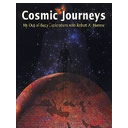Weirdest Planets
 With temperatures ranging from 1000 to 2000°C, gravity 15 times stronger than Earth's, and a year that lasts just 5.6 of our days, HAT-P-2b is not a planet you'd want to visit for vacation.
With temperatures ranging from 1000 to 2000°C, gravity 15 times stronger than Earth's, and a year that lasts just 5.6 of our days, HAT-P-2b is not a planet you'd want to visit for vacation.
The unusual gas giant—located 440 light-years away in the constellation Hercules - turns out to be the most massive planet found outside our solar system so far.
Astronomers at the Harvard-Smithsonian Center for Astrophysics in Cambridge, Massachusetts, spotted the superdense planet using the HATNet global network of automated telescopes, which scans a large fraction of the Northern Hemisphere sky every night to search for planets.
HAT-P-2b, the second planet the project has discovered, stunned scientists with far-out features unprecedented for an alien world.
HAt-P-2b is but one of the odd planets in the cosmos. Journey further into space with this documentary, and discover the weirdest planets of our universe.




More than a bit dated. I can't see any reason for leaving such videos online when they are clearly contain no new info, and properly belong in an archive.
Please remove this description. This is a dead link. This is an 'ex-video'.
It’s joined the bleedin' choir invisible!!
I have always been a true fan of the world around me. I goes the same for any "space". The planemos were my favorite concept to ponder. I'll never understand how so many people can live their whole lives without ever even wondering what lies beyond our eyes.
Something about the whole notion of a planemo fascinates me. When I first heard the name, I thought the etymology of it had something to do with Captain Nemo from Jules Verne's Twenty Thousand Leagues Under the Sea. Just as the Captain and his crew were content with wandering the seas, attached to no nation, so do planemos drift endlessly through outer space.
In reference to the opening remark concerning the 51 Peg B discovery: Michel Mayor wasn't making a "routine observation of stars..." (What does that mean?!) he and Diddier Queloz were looking for a planet to begin with. It wasn't an accidental discovery. People like Geoff Marcy and Peter Van De Kamp had been looking for years. Just to clear that up a little.
did not like this one way too much speculation
I loved those doc's! when I said available resources I was more referring to the technological limitations than financial -- but I see where you are going with your point -- the Zeitgeist films definitely illustrate how our concepts of "mine" and money are holding us back from our true potential, it's sad really.
good for a watch, nothing exciting though...
how old is this doc? looks like the 1980's or some s*** because they said "no other planets have been found orbiting another star."
we've found millions of planets orbiting other stars... wtf is this guy on?
We certainly haven't found "millions" of them. Thousands at this point and this was apparently the third that was discovered but this one was the first discovered around a main-sequence star (in 1995).
why is there no mention of planet Orb69. It was discovered a decade ago by Sir Robert L'orange of the Institute of Belgian Space Observation(IBSO). Its just around the corner from Neptune and a meteor strike away from Pluton. Apparently is grey and there's some rocks on it. Cool eh.
ooohhhh! that planet covered in water is so intriguing, that's where I'd start to look for life if the resources were available.
you don't know what the hell youre talkin about
It's not a matter of whether or not the resources are available for the kind of research you refer to. It's a matter of us getting our heads out of our asses and realizing that thin air materialized into paper (money) doesn't actually dictate anything. Our primitive monetary system is just holding back our potential to accomplish these things, and many others. I highly recommend viewing the Zeitgeist films, available here on TopDoc.
Exactly. That planet frightens me too.
Interesting Documentary. Vlatko, you probably wont see this but this website is AMAZING!!!! I've been glued to it for about more than a week now. What CMS did you use? (Does it say in the FAQ's?). Also, did you make it allll by yourself? :O
Nat. Geo actually made a good space documentary? WOW!
Wow, a decent space documentary from National Geographic? Who would have guessed..
Good Reviews So Far I suppose I could watch....Peace
Where have you been? Everything ok?
Was wondering the same a few days ago, Greg_Mc vanished too. Looks like Lak started something :) Also thought it might be that she was doing some bible study just before she went. C might know:)
Hey Pysmythe Lol :-)....Happy New Year To You...And To ErrBody ....Have Been Ubber Busy lol....
Hello :) All good ? :)
Hey Fifty :-D Yeah Things are all good LoL..Happy New Year To You...I have to Catch Up Lmao...
Well, maybe I was wrong. Speculating that a moon that has not yet been detected around a planet that is heated up to at least 400 C/ 750 F could support life is just stupid. 750 F for a two month span on any planet or moon would cause any liquid water to vaporize. The idea that any an organism would even have a chance to learn to adapt to freeze for 26 months, and then cook at 400 C / 750 F for two months is highly unlikely. Considering in our solar system the only moon out of hundreds with an atmosphere is Titan (orbiting Saturn), if this planet did have any moons orbiting it they would most likely be barren chunks of rock, or be volcanic like Io (orbiting Jupiter). The reason Titan can hold onto an atmosphere is due to it's size (it happens to be bigger than mercury!) and location. If it were much warmer on Titan it would melt into a giant global methane ocean.
Very interesting doc, thanks for posting.